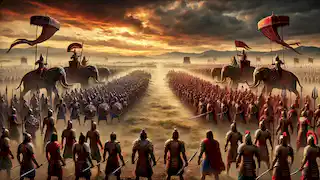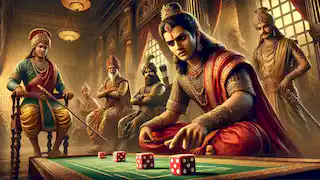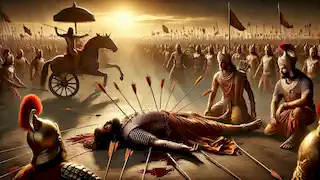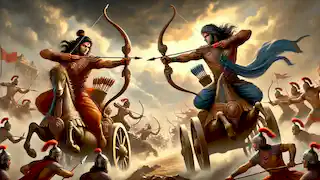The Legend of the Battle of Kurukshetra
Reading Time: 8 min

About Story: The Legend of the Battle of Kurukshetra is a Legend from india set in the Ancient. This Formal tale explores themes of Justice and is suitable for All Ages. It offers Inspirational insights. A legendary war between kin, fought for honor and justice on the plains of Kurukshetra.
In ancient India, long before the modern era, the Battle of Kurukshetra remains one of the most significant events in the grand epic of the Mahabharata. This battle, fought on the plains of Kurukshetra, was not only a struggle for a kingdom but also a moral conflict between right and wrong, dharma and adharma, truth and deceit. It was a cataclysmic clash that echoed through generations, forever shaping the philosophical and spiritual fabric of India.
The Kurukshetra war saw two rival factions of the same family, the Kauravas and the Pandavas, come to blows over a dispute about the kingdom of Hastinapura. On one side were the hundred sons of Dhritarashtra, the Kauravas, led by the ambitious and envious Duryodhana. On the other side were the five sons of Pandu, the Pandavas, who were rightful heirs to the throne but found themselves exiled and wronged by their cousins.
At the heart of this conflict stood the timeless teachings of the Bhagavad Gita, delivered by Lord Krishna to the hesitant warrior Arjuna on the battlefield. The story of Kurukshetra is not just a tale of war but also a tale of duty, righteousness, and the eternal struggle of the human soul. The seeds of the Kurukshetra war were sown long before the battle commenced. Hastinapura, the great capital of the Kuru dynasty, was ruled by King Pandu until his untimely demise. His elder brother, Dhritarashtra, was blind, and because of this disability, he could not claim the throne. After Pandu's death, Dhritarashtra took over the administration as the regent, while the throne was meant for Pandu's sons, the Pandavas. The Pandavas were five brothers: Yudhishthira, Bhima, Arjuna, Nakula, and Sahadeva. Each of them was endowed with extraordinary abilities, and together they represented the strength and virtues of an ideal kingdom. On the other hand, Dhritarashtra's sons, the Kauravas, led by Duryodhana, grew envious of their cousins. The resentment brewed from childhood, and it escalated over time. The Pandavas were always just and kind, earning the love and respect of the people. Yudhishthira, the eldest, was known for his unyielding righteousness, while Bhima’s immense strength and Arjuna's unmatched skill with the bow made them formidable. However, it was their deep bond with Lord Krishna, their guide, and mentor, that made them truly invincible. Jealousy and rivalry led Duryodhana to resort to deceit. Along with his uncle Shakuni, he devised numerous plots to kill the Pandavas. However, the most infamous of all was the rigged dice game, where Yudhishthira, bound by his moral code of honesty, lost everything — his kingdom, his brothers, and even Draupadi, the queen of the Pandavas. The dice game was a pivotal moment that ultimately led to the war. In this high-stakes game, Yudhishthira gambled away all that the Pandavas held dear, and they were forced into exile for thirteen years. During this period, the Pandavas traveled far and wide, gaining wisdom, strength, and allies. But above all, they earned the unwavering support of Lord Krishna, who was to play a crucial role in the events that followed. The final year of their exile required them to remain incognito, hiding their identities and living in disguise. They took shelter in the kingdom of Virata, where they served under assumed identities. Despite their trials, they remained steadfast in their values, always adhering to dharma — the moral and cosmic law that governed the universe. Meanwhile, Duryodhana was growing increasingly insecure. Though he ruled the kingdom, he knew that the Pandavas' rightful claim to Hastinapura was stronger, and their popularity among the people made him anxious. His insecurity led him to reject every peace offer, and even Krishna's attempts at reconciliation failed. When the Pandavas' exile ended, they requested the return of their rightful share of the kingdom. But Duryodhana, blinded by pride and ambition, refused to give them even a single village. Thus, war became inevitable. The Kurukshetra battlefield was vast, stretching as far as the eye could see. Both sides prepared for war, and alliances were forged with the various kingdoms of ancient India. The Pandavas, though fewer in number, had powerful allies, including the mighty king of Panchala and the undefeated Arjuna with his bow Gandiva. On the other hand, the Kauravas had gathered a massive army, bolstered by the powerful warriors Bhishma, Drona, and Karna. As the two armies stood face to face, the tension in the air was palpable. The battlefield was filled with the sounds of conch shells, war cries, and the clashing of armor. But amid this chaos, one moment of hesitation would change everything. Arjuna, the greatest archer of his time, stood in his chariot, driven by Lord Krishna. As he surveyed the battlefield, he saw his beloved family members, teachers, and friends on both sides. A wave of doubt and despair washed over him, and he lowered his bow, refusing to fight. It was at this moment that Lord Krishna delivered the timeless teachings of the Bhagavad Gita. He reminded Arjuna of his duty as a warrior, of the transient nature of life, and the importance of dharma. He explained the eternal cycle of birth and death and the concept of detachment from the fruits of one's actions. With Krishna’s guidance, Arjuna regained his resolve. He understood that his duty was to fight for justice and righteousness, even if it meant standing against his own kin. The war began with renewed ferocity. The Kurukshetra war lasted for eighteen days, with each day bringing new strategies, alliances, and heartbreaking losses. The first ten days were dominated by the Kauravas under the leadership of Bhishma, the grandsire of both the Pandavas and the Kauravas. Bhishma was invincible, and the Pandavas found it impossible to gain the upper hand while he led the Kaurava army. But Bhishma had one weakness — his love for the Pandavas. He had taken a vow never to kill any of them. Despite his loyalty to Duryodhana, his heart ached for the sons of Pandu. Knowing this, the Pandavas devised a strategy with Krishna's help to incapacitate him without killing him. On the tenth day, Arjuna shot a volley of arrows at Bhishma, piercing his armor and pinning him to the ground. Bhishma lay on a bed of arrows, waiting for the auspicious moment to leave his mortal body, but the war raged on. After Bhishma's fall, Drona, the revered teacher of both the Pandavas and the Kauravas, took command of the Kaurava army. He was a brilliant strategist and fierce warrior, but his heart too was torn by his affection for his former students, the Pandavas. On the fifteenth day, the Pandavas devised a plan to deceive Drona into believing that his son, Ashwatthama, had been killed. This deception caused Drona to lose his will to fight, and he was ultimately killed by Dhrishtadyumna, the commander of the Pandava forces. As the war neared its conclusion, Karna, Duryodhana's closest ally and one of the mightiest warriors, took center stage. Karna was an enigmatic figure, cursed by fate, yet revered for his loyalty and valor. Unknown to many, Karna was the eldest son of Kunti, making him the half-brother of the Pandavas. However, Karna's loyalty to Duryodhana was unwavering. Karna and Arjuna, two of the greatest archers, faced off in a battle that would decide the fate of the war. In a fierce duel, Arjuna, guided by Krishna, emerged victorious, killing Karna. The eighteenth and final day saw the downfall of the Kauravas. Duryodhana, their leader, was gravely wounded in a mace fight with Bhima. As Duryodhana lay dying, his body broken and his ambitions shattered, he reflected on the choices that had led him to this point. The Pandavas emerged victorious, but the cost of victory was immense. The battlefield of Kurukshetra was littered with the bodies of countless warriors, friends, and family members. The Pandavas themselves were filled with grief and regret, questioning whether the throne was worth the bloodshed. Yudhishthira, the eldest Pandava, was crowned king, but his heart was heavy with sorrow. The victory felt hollow, as the price of dharma had been paid in blood. Yet, Lord Krishna reminded him that this war had been necessary to restore balance and justice. The war of Kurukshetra was not just a physical battle but a spiritual one. It taught the world the importance of duty, the consequences of greed and envy, and the inevitability of karma. The Bhagavad Gita, delivered on the battlefield, remains a timeless guide for those seeking wisdom and spiritual clarity. Though the kingdom of Hastinapura was restored to the Pandavas, the real legacy of the battle was the profound lessons it left behind. The story of Kurukshetra is one of sacrifice, duty, and the eternal struggle between good and evil, a reminder that righteousness, though difficult, must always prevail. The Battle of Kurukshetra is more than just a historical conflict; it is a story that resonates with moral and philosophical truths relevant even in the modern world. It speaks of the responsibilities that come with power, the inevitability of conflict in the pursuit of justice, and the price that is often paid for upholding righteousness. The legend of this battle, enshrined in the Mahabharata, continues to inspire and challenge the human spirit to this day.The Beginning of the Conflict

The Dice Game and Exile
The Great War Begins

The Days of Battle

The Aftermath and Lessons of Kurukshetra

Conclusion

















